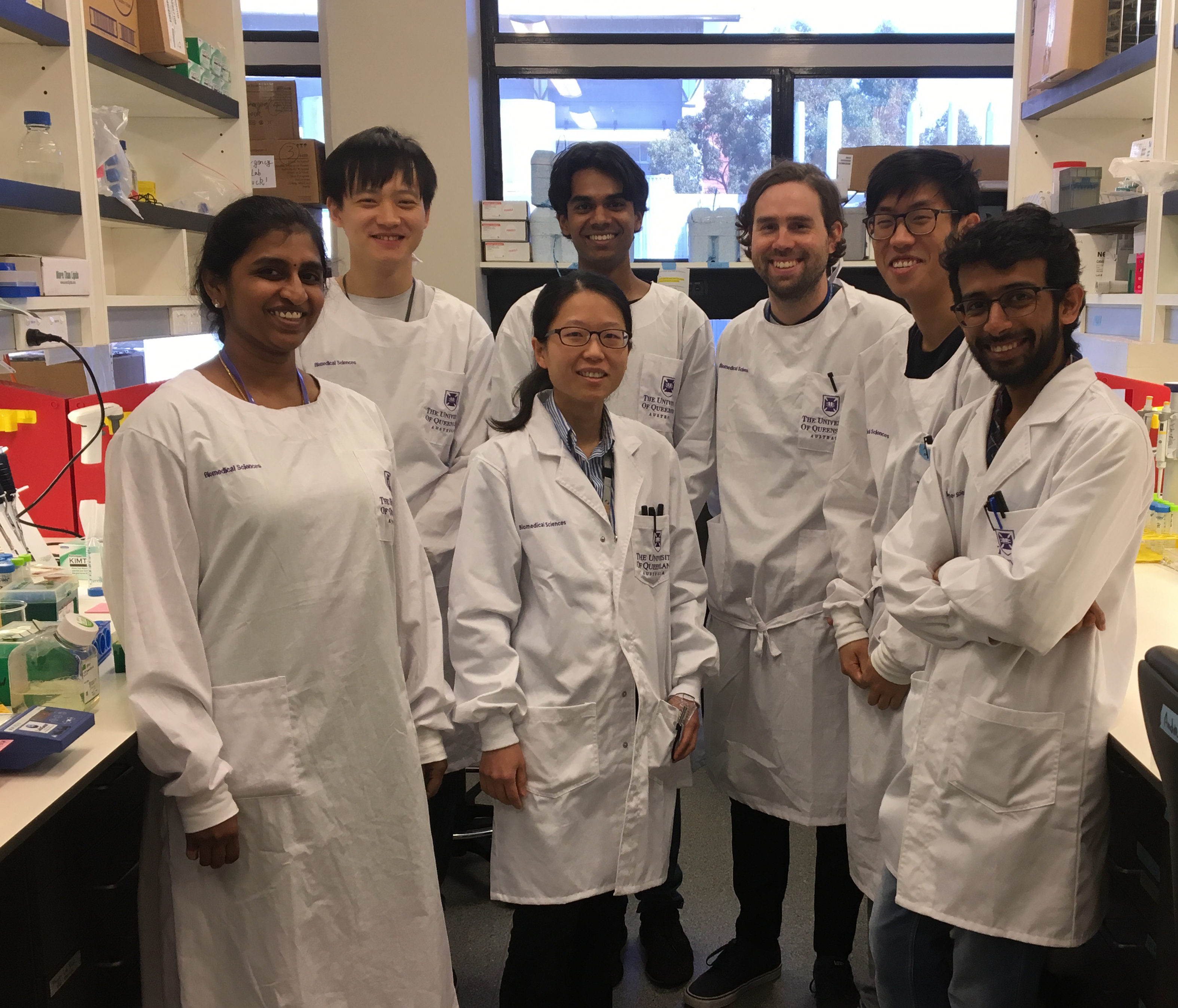Wu Lab - Cancer therapeutics

The ultimate goal of my research is to develop effective strategies for detection and treatment of ovarian and breast cancers, and translate these research findings into the clinic. Specifically, we are interested in (1) Developing strategies to overcome immunosuppression in ovarian and breast cancers; (2) Developing biomimetic nanoparticle platforms for tumour-targeted delivery of RNAi therapeutics; and (3) Understanding the role of exosomes in ovarian cancer progression.
Harnessing the immune system to battle ovarian cancer
Ovarian cancer is the most lethal form of gynaecologic malignancy with 5-year survival rate of only 35-40%. The high recurrence rate presents a major challenge in the clinical management of high grade serous ovarian cancer. While stimulating our own immune system to recognize and attack tumour cells represents an attractive means to facilitate complete elimination of tumours, emerging data suggest that many of the immunotherapy tools have promising but limited effects in ovarian cancer. To address this unmet need, my lab focuses on developing novel strategies to enhance anti-tumour immunity in ovarian cancer. We utilise systems-based approach combined with RNA interference technology to target clinically important immune suppressive factors with the goal of enhancing cytotoxic T-cell functions in ovarian tumours. Ultimately, the ability to effectively stimulate the immune system to attack tumour cells could significantly improve outcomes of women with ovarian cancer. The technology we develop can also be applied for treatment of other cancer types.
Tumour-targeted delivery systems
My lab is focusing on developing clinically translatable tumour-targeted delivery systems for RNAi therapeutics. SiRNA, a short double stranded RNA, represents an attractive means to mediate down-regulation of target genes. Unlike conventional small molecule inhibitors or monoclonal antibodies, siRNA is highly specific to its target and has a much wider clinical applicability as its use is not limited to targeting ligands or kinases. Several early phase trials have reported clinical responses in cancer patients after RNAi therapy. Despite the promise of existing synthetic delivery systems, the reported spleen, liver, and immune-related toxicities in early phase clinical trials must be overcome before RNAi can meet the standards for clinical use. To address this need, we are developing a novel and biocompatible delivery strategy using naturally occurring exosomes that are highly efficient in delivering their cargo to recipient cells. Being natural transporters, exosomes are also less likely to exert toxicity or elicit immune responses.
Role of exosomes in cancer progression
Exosomes are tiny lipid vesicles that can be generated by many cell types in our body. They serve as effective means for cells to communicate with each other, even when they are located remote from each other. Cancer cells, in particular, produce large quantities of exosomes with distinct markers and characteristics. The content of these exosomes highly reflects the characteristics of the cells that generate them. Our lab is interested in understanding the role of exosomes in cancer progression and metastasis.
Positions are available across our research program for undergraduates, honours students, PhD students, and postdoctoral fellows. If you are interested in joining our lab, please contact Dr Wu.
Potential research projects include, but not limited to:
- Theme 1: Harnessing the immune system to battle ovarian and breast cancers
- Theme 2: Developing clinically translatable nano-systems to break down immune barriers
- Theme 3: Understanding the role of exosomes in cancer progression
- 2018-2020 Cancer Institute NSW Career Development Fellowship - Targeting the “undruggable”: Re-activating anti-tumour immunity by silencing N-MYC in ovarian cancer and neuroblastoma (Declined, due to relocation to Brisbane)
- 2017-2018 National Institute of Health (NIH) R35 Maximizing Investigators’ Research Award - In vivo genetic engineering of T-cells for treatment of human diseases.
- 2017-2018 Australian Ovarian Cancer Research Foundation - Re-activating anti-tumour immunity by targeting N-MYC-Let7 axis in ovarian cancer.
- 2017-2024 National Institute of Health (NIH) R35 - Harnessing the power of exosomes for non-coding RNA delivery.
- 2016-2019 Ovarian Cancer Research Fund Alliance The Liz Tilberis Early Career Award - Re-activating anti-tumor immunity using non-coding RNAs.
- 2016-2017 Colleen’s Dream Foundation Pilot Study Grant - Using exosomes for detection of ovarian cancer.
- 2015 Texas Center for Cancer Nanomedicine Pilot study grant - Development of biomimetic nanosystems for delivering miRNAs for cancer treatment.
- 2014-2017 Foundation for Women’s Cancer - Caring Together, NY Ovarian Cancer Research Grant
- 2013-2015 Cancer Prevention Research Institute of Texas Keck Computational Cancer Biology Postdoctoral Fellowship
- 2013-2014 Texas Center for Cancer Nanomedicine Postdoc Research Award - A biomimetic bi-functional controlled release delivery platform for cancer treatment
- 2011-2014 Cancer Prevention Research Institute of Texas TRIUMPH (Translational Research in Multi-Disciplinary Program) Postdoctoral Fellowship
- 2011-2013 Ovarian Cancer Research Fund Ann Schreiber Mentored Investigator Grant - Novel anti-angiogenic strategies for ovarian cancer treatment.
- 2006-2009 NHMRC Postgraduate Scholarship - Delivery of siRNA for cancer treatment.
The ultimate goal of our laboratory is to develop novel strategies to overcome immunosuppression in ovarian and breast cancers. We have unique systems set up in our laboratory for high throughput tumour immune profiling and therapeutic assessment of novel compounds in immune competent mouse models of ovarian cancer. We specialise in in vivo application of RNAi therapeutics and utilise bioinformatic approaches to identify novel targets for treatment of cancer.
High throughput immune profiling of tumours
We have systems set up for high throughput tumourimmune assessment. This includes assessment of thenumber and function of immune cells present in solidtumours. Typical immune cell types assessed are Bcells, T helper cells, Tregs, CD8 T-cells, dendritic cells,macrophages, NK cells, NKT cells, and myeloid derivedsuppressive cells. The assay will allow researchers toefficiently identify major immune cell populationsaffected by certain therapeutics.
In vivo nanoparticle delivery of RNAi therapeutics
We have unique systems set up for studying thebiological function of RNAi therapeutics (e.g.,siRNA, microRNA) in cancer mouse models. This will facilitate the understanding of biological consequences of switching off or turning on specific coding or non-coding RNAs.
Mouse models of cancer (ovarian cancer)
Our laboratory has multiple orthotopic mousemodels of ovarian cancer set up for studyingtherapeutic activity of novel compounds. Weroutinely perform assays to investigate impact oftherapeutics on blood vessel density, immune cellinfiltration, proliferation and apoptosis in tumours.
Characterisation of extracellular vesicles
We have systems set up for extracting extracellularvesicles from biological fluids. We perform severaldownstream assessments of these extracellularvesicles including functional testings and RNA/protein expression analyses.
Pathway enrichment bioinformatics analysis
We utilise bioinformatic pathway enrichmentstrategies to identify novel targets for cancertreatment. We routinely perform gene enrichmentanalyses to understand molecular mechanisms bywhich certain cancer therapeutics function.
Find out more about our diverse range of research interests.




